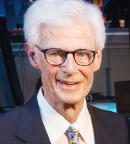
Charles A. LeMaistre, MD
In 1978, Charles A. “Mickey” LeMaistre, MD, was named President of The University of Texas MD Anderson Cancer Center. During his 18-year tenure, MD Anderson became a world leader in outpatient care for cancer patients and the nation’s largest ambulatory treatment and surgery programs in cancers. In 2015, Dr. LeMaistre was inducted into the Health Care Hall of Fame. Dr. LeMaistre died on January 28, 2017, in Houston, Texas. He was 92.
Dr. LeMaistre was born on February 10, 1924, in Lockhart, Alabama. At birth, his father gave him the nickname “Mickey,” a sobriquet that Dr. LeMaistre preferred over his given name, Charles. His decision to pursue a career in medicine was due, at least in part, to an encounter with the medical world when, as a 10-year-old, he suffered a ruptured appendix while walking in the woods with his German Shepherd, Inga. He recalled the incident during an interview.
“I was lying on the ground, and Inga took off and left me alone. She went to my home and got two of my brothers, who carried me back. I was operated on immediately. It was a lesson I reflected on many times, because there was some reason why I survived that.”
From Tuscaloosa to Atlanta
Dr. LeMaistre had an early interest in becoming a doctor and had planned on attending the Naval Academy in Annapolis, on an appointment from then Alabama senator, Lister Hill. But a week before entering the Academy, he suffered a serious eye injury that made him ineligible. Instead, Dr. LeMaistre attended the University of Alabama in Tuscaloosa, the town where he moved with his mother and five older siblings after his father’s death.
After receiving his undergraduate degree, he went to Cornell University, receiving his MD in 1947. Following graduation, Dr. LeMaistre stayed at Cornell as a faculty member, teaching and practicing medicine. In 1954, he left Cornell and joined Emory University in Atlanta, where he stayed for 5 years teaching in internal medicine and conducting a research program. While at Emory, Dr. LeMaistre started a department of preventive medicine; highlighting prevention would be the hallmark of his career.
Distinguished Career in Texas
Dr. LeMaistre left Atlanta in 1959 to become Professor of Internal Medicine at the University of Texas Southwestern Medical School in Dallas. In Dallas, Dr. LeMaistre’s crusade against cancer blossomed, as he was chosen as 1 of 10 members on the first surgeon general’s advisory committee on smoking and health, which would author the landmark 1964 report that labeled tobacco as the leading cause of lung cancer.
Mickey was one of the great icons of 20th century medicine who pushed boundaries, drove innovation, and positioned MD Anderson to be the world’s most impactful cancer center.— Ronald A. DePinho, MD
Tweet this quote
In 1971, Dr. LeMaistre was elected Chancellor for the University of Texas Medical School and directed a huge expansion of the University of Texas system, which included new medical schools in Houston and San Antonio. In 1978, he assumed the presidency of The University of Texas MD Anderson Cancer Center. While serving at MD Anderson, Dr. LeMaistre developed a cancer prevention division that focused on epidemiology, behavioral sciences, and working with patients who had a family history of cancer. He also played a major role in expanding the center beyond Houston, bringing it to the community rather than requiring patients to come to the cancer center.
Dr. LeMaistre retired from MD Anderson in 1996 but returned in 2006 as a part-time Professor of Behavioral Science in the Division of Cancer Prevention and Population Sciences, which he founded years earlier. Colleagues said that he spent the next 2 years writing about tobacco-related issues, including the evolution of public policies on tobacco control. A book on this topic will be published later in 2017. Dr. LeMaistre continued to play a role in the fight against cancer until his death.
Tribute to Excellence
Upon the news of his death, tributes flowed in from across the country. MD Anderson President, Ronald A. DePinho, MD, said: “Mickey was one of the great icons of 20th century medicine who pushed boundaries, drove innovation, and positioned MD Anderson to be the world’s most impactful cancer center. His excellence is reflected to this day in the halls of our institution and in the countless lives saved around the globe.” ■

